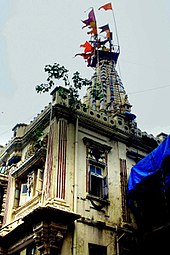The name Mumbai is an eponym, derived from Mumba or Maha-Amba—the name of the Koli goddess Mumbadevi—and Aai, "mother" in the language of Marathi.
The oldest known names for the city are Kakamuchee and Galajunkja; these are sometimes still used. Ali Muhammad Khan, in the Mirat-i-Ahmedi (1507) referred to the city as Manbai. In 1508, Portuguese writer Gaspar Correia used the name Bombaim, in his Lendas da Índia ("Legends of India"). This name possibly originated as the Old Portuguese phrase bom baim, meaning "good little bay", and Bombaim is still commonly used in Portuguese. In 1516, Portuguese explorer Duarte Barbosa used the name Tana-Maiambu: Tana appears to refer to the adjoining town of Thane and Maiambu to Mumbadevi.
Other variations recorded in the 16th and the 17th centuries include: Mombayn (1525), Bombay (1538), Bombain (1552), Bombaym (1552), Monbaym (1554),Mombaim (1563), Mombaym (1644), Bambaye (1666), Bombaiim (1666), Bombeye (1676), and Boon Bay (1690). After the British gained possession of the city in the 17th century, the Portuguese name was officially anglicised as Bombay.
By the late 20th century, the city was known as Mumbai or Mambai to Marathi and Gujarati speakers and as Bambai in Hindi, Persian and Urdu. The English name was officially changed to Mumbai in November 1995. This came at the insistence of the Marathi nationalist Shiv Sena party that had just won the Maharashtra state elections and mirrored similar name changes across the country. A theory was proposed suggesting that "Bombay" was a corrupted English version of "Mumbai" and an unwanted legacy of British colonial rule. The push to rename Bombay was part of a larger movement to strengthen Marathi identity in the Maharashtra region. However, the city is still referred to as Bombay by some of its residents and Indians from other regions as well. However, mentions of the city by the name other than Mumbai have been controversial, resulting in emotional outbursts sometimes of a violently political nature.
A widespread popular etymology of Bombay holds that it was derived from a Portuguese name meaning "good bay". This is based on the facts that bom is Portuguese for "good" and baía (or the archaic spelling bahia) means "bay". However, this literal translation would have been incorrect in grammatical gender, as bomis masculine, while baia is feminine; a correct Portuguese rendering of "good bay" would be boa ba(h)ia. Having said this, baim is an archaic, masculine word for "little bay"
Portuguese scholar José Pedro Machado in his Dicionário Onomástico Etimológico da Língua Portuguesa (1981; "Portuguese Dictionary of Onomastics and Etymology"), seems to reject the "Bom Bahia" hypothesis, suggesting that the presence of a bay was a coincidence (rather than a basis of the toponym) and led to a misconception, that the noun (bahia; "bay") was an integral part of the Portuguese name.

No comments:
Post a Comment